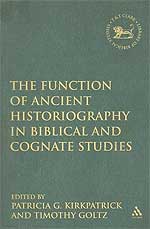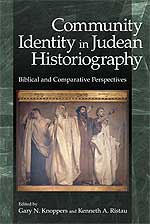As a member of the Steering Committee of the Ancient Historiography Seminar in the Canadian Society of Biblical Studies, I am pleased to report that the programme for our inaugural sessions is now available. Here is a the schedule for this year’s seminar:
Function of Historiography – Hebrew Bible /
La Fonctionne de l’Historiographie – Bible Hébraïque
Tuesday 30 May 2006 – 8:45-12:00 (ACE 002)
Chair / Président: Tyler Williams (Taylor University College)
8:45-9:05 am – Is the Book of Kings Deuteronomistic? And is it a History?
Kurt Noll (Brandon University)
The consensus among biblical scholars is that Kings is a work of history, probably the final instalment of Martin Noth’s Deuteronomistic History. To date, the best two attempts to defend that genre designation are those of John Van Seters and Baruch Halpern. Van Seters compares the Former Prophets to ANE literature, while Halpern stresses rhetorical structures indicating what Halpern calls “antiquarianism” in the text. However, recent researchers on Kings have raised issues that perhaps require a reassessment of the question about genre. On textual grounds, one can argue that Deuteronomy did not influence the earlier stages of composition and that later stages were no longer concerned with “antiquarianism.” This paper will review the debate between Halpern and Van Seters in light of the more recent research, revisit both the comparative argument and the argument based on rhetorical structures in the text, and offer a possible solution to the question of genre in the book of Kings.
9:05-9:15 am – Discussion
9:15-9:35 am – Uses of the Past: The Stories of David and Solomon as Test Cases
John Van Seters (Waterloo, ON)
For the accounts of the reigns of David and Solomon scholars have suggested various layers in the books of Samuel and Kings, some regarded as near-contemporary pieces of historiography and have proposed various functions for the stories: propagandistic, apologetic, antimonarchic, etcetera. In this study I will look at some of these proposals in the light of comparative models and make some suggestions of my own.
9:35-9:45 Discussion
9:45-10:05 am – Sennacherib’s Campaign Against Judah: What Saith the Scriptures?
Paul Evans (Wycliffe College)
This paper won the Founders’ Prize and will be read on Sunday afternoon. It will be summarized at this session.
This paper provides a close reading of the Hezekiah-Sennacherib narrative of 2 Kings 18-19 which, with the aid of a Rhetorical analysis, will: 1) reassess putative sources found in the text (questioning the traditional A and B source delineations); and 2) reveal common misreadings of the biblical text (e.g., that a siege of Jerusalem is referred to and that Sennacherib’s army is said to be defeated outside the walls of Jerusalem). This study will then analyze the implications of these results for the use of this biblical text in historical reconstruction.
10:05-10:15 am – Discussion
10:15-10:30 – Break
10:30-10:50 am – The Chronicler as Elite
Tim Goltz (McGill University)
Noam Chomsky is credited with the observation, “The Internet is an elite organization; most of the population of the world has never even made a phone call.” If the “eliteness” of communities is, in part, measured by their ability to effectively communicate their message, the model of the Internet elite demonstrates a truism of human societies; that the majority of recorded communication is representative of relatively few individuals who tend to wield a disproportionate amount of power. In Western societies which communicate so freely and cheaply, it is sometimes difficult to imagine ancient societies where significant literary agency was limited to so very few people. As a member of the Yehudite elite, the Chronicler was one of those few. Most likely supported by the Jerusalem Temple, he wrote a revisionist account of the history of “Israel” which has been retained as the book(s) of Chronicles. Employing a unique comparative theory from the emerging discipline of elite studies within the humanities, this paper seeks to address the issue of what the term “elite” means in terms of the ancient Yehudite literati. Widely used but rarely dissected, the paper is also an appeal for biblical scholars to more critically engage the implications of term “elite” as applied to socio-historical reconstructions of ancient Israel, and, indeed, to related ANE cultures.
10:50-11:00 – Discussion
11:00-11:20 am – Tyler Williams (Taylor University College)
The Function of Historiography: A Synthesis and Response to Kurt Noll, John Van Seters, Paul Evans, and Tim Goltz
11:20-12:00 am – Discussion
Function of Historiography – Classics, Intertestamental Literature, and the Gospels / La Fonctionne de l’Historiographie – Les Littératures Classiques et Intertestamentaire, et les Évangiles
Tuesday 30 May 2006 – 1:30-14:30 pm (ACE 002)
Chair / Président: Todd Penner (Austin College)
1:30-1:50 pm – Dilys Patterson (Concordia University)
Once Upon a Time: Women as Leaders in Historiography and the Ancient Novel
In antiquity it was rare for a woman to be in a leadership role. Leadership typically meant having authority over men and participating in the male dominated public sphere, which, according to the cultural values of the day, was not the proper place for women. Nevertheless, women do figure sporadically in historiography and are central characters in Jewish novels. The Book of Judith, for instance, not only situates itself in Israel’s past but also demonstrates a solid appreciation of Israel’s history. Both historiography and the ancient novel therefore draw on the past to create meaning. This paper examines the anomalous position of female leadership and the use of this type of leadership to create meaning in three historiographies, The Histories by Herodotus, The Jewish War and Jewish Antiquities by Flavius Josephus, and the Jewish novel, Judith.
1:50-2:00 pm – Discussion
2:00-2:20 pm – Craig A. Evans (Acadia Divinity College)
Gospel Historiography and Biblical Epic
The four New Testament evangelists present the “history of Jesus” in distinctive ways. Their writing strategies place them in the general context of other Jewish writers of late antiquity, such as Josephus who writes an apologetical historical treatise, or Philo the epic poet, Orphica, Ezekiel the Tragedian, or a variety of other Jewish poets who imitated Greek style in their respective efforts to retell various parts of Israel’s sacred story or what we might regard in a certain sense “Biblical Epic.” The New Testament Gospels represent examples of the creative ways that Jews and persons caught up in the story of Israel attempted to retell sacred history in the genres and forms current in their day, including the forms found in Scripture itself. Although the strategies of the respective evangelists vary, their gospels are rooted in and linked to Scripture in important ways and so represent efforts to tell Israel’s story, centered on the figure of Jesus the Messiah.
2:20-2:30 pm – Discussion
2:30-2:50 pm – Sean Adams (McMaster Divinity College)
Ancient Greek Historiography and its Methodology: How Does Luke Relate?
2:50-3:00 pm – Discussion
3:00-3:15 pm – Break
3:15-3:35 pm – Eve-Marie Becker (Oberassistentin Institut für Neues Testament)
The Gospel of Mark in context of ancient historiography
My paper will expound on the approach of my “Habilitationsschrift” which will be published in Tübingen (Wissenschaftliche Untersuchungen zum Neuen Testament) in 2006: Das Markus-Evangelium im Rahmen antiker Historiographie. This approach is firstly historical and secondly methodological: ad 1: The Gospel of Mark seems to be the first record of early Christian writing, which has put the story of Jesus in a chronological and narrative order. Which specific historical circumstances have made the narrativization of the Jesus-story necessary? Reasons for that could probably be found in the events of the first Jewish revolt and the destruction of the Second Temple (70 A.D.). Is there any textual evidence within Mark’s Gospel for these historical events? and 2: The way Mark uses traditions and sources can be compared to the techniques of ancient historiographical writers. In this perspective, historiography can be defined as a narrativization of at least partially historical traditions. The discussion about the Gospel’s genre (biographical literature?) is – in that sense – has to be resumed once again.
3:35-3:45 pm – Discussion
3:45-4:30 – Discussion
This looks like an exciting session. I will be updating the Ancient Historiography Seminar Website in the next few days. I will let you know when everything is uploaded.



